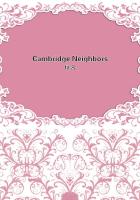[<italic> OEuvres de Frederic, <end italic> xxvi. 394 (Friedrich to Prince Henri, 29th June, 1777.)] As shall be noticed, if we have time. No enlightened Public, gazing for forty or fifty years into an important Neighbor Gentleman, with intent for practical knowledge of him, could well, though assisted by the cleverest Hanburys, and Demon and Angel Newswriters, have achieved less!--Question THIRD is-- But Question Third, so extremely important was it in the sequel, will deserve a Chapter to itself.
Chapter XIV.
THERE IS LIKE TO BE ANOTHER WAR AHEAD.
Question Third, French-English Canada Question, is no other than, under a new form, our old friend the inexorable JENKINS'S-EARQUESTION; soul of all these Controversies, and--except Silesia and Friedrich's Question--the one meaning they have! Huddled together it had been, at the Peace of Aix-la-Chapelle, and left for closed under "New Spanish Assiento Treaty," or I know not what:--you thought to close it by Diplomatic putty and varnish in that manner:
and here, by law of Nature, it comes welling up on you anew. For ITsprings from the Centre, as we often say, and is the fountain and determining element of very large Sections of Human History, still hidden in the unseen Time.
"Ocean Highway to be free; for the English and others who have business on it?" The English have a real and weighty errand there.
"English to trade and navigate, as the Law of Nature orders, on those Seas; and to ponderate or preponderate there, according to the real amount of weight they and their errand have? OR, English to have their ears torn off; and imperious French-Spanish Bourbons, grounding on extinct Pope's-meridians, GLOIRE and other imaginary bases, to take command?" The incalculable Yankee Nations, shall they be in effect YANGKEE ("English" with a difference), or FRANGCEE ("French" with a difference)? A Question not to be closed by Diplomatic putty, try as you will!
By Treaty of Utrecht (1713), "all Nova Scotia [ACADIE as then called], with Newfoundland and the adjacent Islands," was ceded to the English, and has ever since been possessed by them accordingly.
Unluckily that Treaty omitted to settle a Line of Boundary to landward, or westward, for their "NOVA SCOTIA;" or generally, a Boundary from NORTH TO SOUTH between the British Colonies and the French in those parts.
The Treaty of Aix-la-Chapelle, eager to conclude itself, stipulated, with great distinctness, that Cape Breton, all its guns and furnishings entire, should be restored at once (France extremely anxious on that point); but for the rest had, being in such haste, flung itself altogether into the principle of STATUS-QUO-ANTE, as the short way for getting through. The boundary in America was vaguely defined, as "now to be what it had been before the War." It had, for many years before the War, been a subject of constant altercation. ACADIE, for instance, the NOVA SCOTIA of the English since Utrecht time, the French maintained to mean only "the Peninsula", or Nook included between the Ocean Waters and the Bay of Fundy. And, more emphatic still, on the "Isthmus" (or narrow space, at northwest, between said Bay and the Ocean or the Gulf of St. Lawrence) they had built "Forts:" "Stockades," or I know not what, "on the Missaquish" (HODIE Missiquash), a winding difficult river, northmost of the Bay of Fundy's rivers, which the French affirm to be the real limit in that quarter. The sparse French Colonists of the interior, subjects of England, are not to be conciliated by perfect toleration of religion and the like;but have an invincible proclivity to join their Countrymen outside, and wish well to those Stockades on the Missiquash. It must be owned, too, the French Official People are far from scrupulous or squeamish; show energy of management; and are very skilful with the Indians, who are an important item. Canada is all French; has its Quebecs, Montreals, a St. Lawrence River occupied at all the good military points, and serving at once as bulwark and highway.
Southward and westward, France, in its exuberant humor, claims for itself The whole Basin of the St. Lawrence, and the whole Basin of the Mississippi as well: "Have not we Stockades, Castles, at the military points; Fortified Places in Louisiana itself?" Yes;--and how many Ploughed Fields bearing Crop have you? It is to the good Plougher, not ultimately to the good Cannonier, that those portions of Creation will belong? The exuberant intention of the French is, after getting back Cape Breton, "To restrict those aspiring English Colonies," mere Ploughers and Traders, hardly numbering above one million, "to the Space eastward of the Alleghany Mountains," over which they are beginning to climb, "and southward of that Missiquash, or, at farthest, of the Penobscot and Kennebunk"(rivers HODIE in the State of Maine). [La Gallisonniere, Governor of Canada's DESPATCH, "Quebec, 15th January, 1749" (cited in Bancroft, <italic> History of the United States, <end italic>
Boston, 1839, et seq.). "The English Inhabitants are computed at 1,051,000; French (in Canada 45,000, in Louisiana 7,000), in all 52,000:" <italic> History of British Dominions in North America <end italic> (London, 1773), p. 13. Bancroft (i. 154) counts the English Colonists in "1754 about 1,200,000."] That will be a very pretty Parallelogram for them and their ploughs and trade-packs:
we, who are 50,000 odd, expert with the rifle far beyond them, will occupy the rest of the world. Such is the French exuberant notion:












